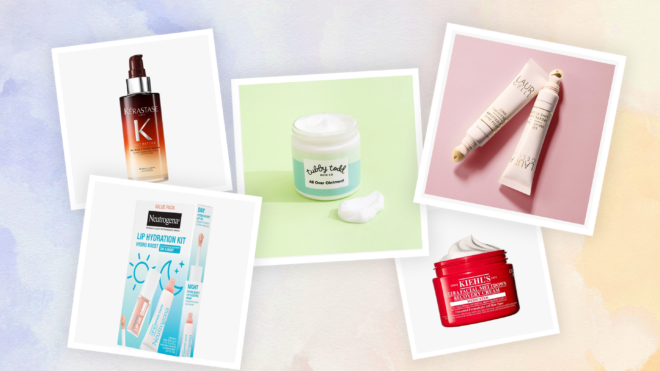
What Can Dogs Eat?

You know you’re not supposed to feed your dog chocolate, onions, grapes/raisins, macadamia nuts or avocados. You monitor for sensitivity to common food allergens such as meat, corn, wheat and soy.
But you’re only human, and sometimes it’s hard to resist your dog’s sweet stare as he begs you with his eyes to share some of that delicious human cuisine. When you want to give him a treat from your table, do you know which foods are safe to feed your pup?
To find the answer, we called upon Liz Palika, author of “The Ultimate Pet Food Guide,” and animal nutritionist, Susan Lauten, Ph.D., of Pet Nutrition Consulting, to explain which fresh, frozen and canned foods people typically eat that are safe for dogs to consume, too.
Melons

Watermelon, cantaloupe and honeydew are all healthy options for your pooch. “My dogs will take me down over cantaloupe,” says Lauten. “I am required to share the whole thing with them.” Consult animal poison control before feeding your dogs any of the more exotic melons, though.
Berries (fresh and frozen)

Blueberries, blackberries, strawberries, huckleberries or raspberries are all good for your furry friend for the same reason they’re good for humans: free-radical-fighting antioxidants. “A lot of dogs like them frozen,” says Lauten.
Apple Slices

Lauten recommends serving your pup seedless, organic apple slices, because apple seeds naturally contain cyanide. Citrus fruits such as oranges are good too, but leave off the rinds. They contain many oils and could be too strong for a dog’s digestive system.
Baby Carrots

Fresh, crunchy vegetables are good for your dog’s teeth, says Lauten. Plus, it’s a bit easier not to overfeed with veggies. “If you’re giving your dog vegetables, you can give a lot more in volume,” because these are low-calorie foods.
Peanut Butter

Peanuts don’t appear to cause allergies in dogs like they do in people, says Lauten. “I have some highly food-sensitive dogs for whom peanut butter is a large part of their diet.”
Cheese

This is a safe snack for dogs, but just like humans, they can experience lactose intolerance, so monitor your dog’s reaction. “Many families use a dollop of cottage cheese with every meal,” says Lauten. To avoid overfeeding, consider giving your dog low- or reduced-fat dairy products.
Bananas

“My dogs love bananas, and I share mine with them regularly,” says Lauten.
“All fruits have phytonutrients and required nutrients. They are good for all of us. If the foods are healthy for me, they are more apt to be healthy for the dog,” says Palika.
Green Beans

Because this veggie fills dogs up, weight-management programs often include green beans, usually canned with no salt added, says Lauten. “An entire can of green beans contains 70 calories. What a bargain, and filling too!”
Of course every dog is different and you and your vet know best if he or she has any food sensitivities, weight issues or other health concerns that should guide your dog’s diet. It is always a good idea to check with your pet’s doctor if you are planning on changing what your dog eats. Also keep in mind that it is best to introduce new foods to your dog slowly. You don’t want your pooch to get gas, bloating, soft stools or other digestive problems.
Cooked Chicken

Ran out of your dog’s regular food? Whether boiled, baked, served rotisserie-style or grilled, this food is a healthy substitute. “Dogs will eat a freshly cooked chicken any way they can get it,” says Lauten.
Healthy dogs can handle cooking oils and seasonings. Just be sure to avoid adding onions or too much garlic. If you’re concerned, non-salt seasonings can be used, but that matters more for the human eater than the dog, explains Lauten. Scrambled eggs, hamburger, rice, pasta and/or oatmeal can serve as meal replacements in a pinch, adds Lauten.
Sunflower Seeds (Shelled)

Skip the salt if possible, or serve in moderation, recommends Lauten. “Remember, treats should not comprise more than 10 percent of your dog’s daily calorie intake. If your dog gets 500 calories a day, 50 calories could come from treats.”
Cashews

Cashews are a nice treat for dogs. They are full of calcium, magnesium and protein. However, while they are less fatty than other nuts, they are still a source of fat. So, as always, everything in moderation for your pooch!
Coconut

Go loco for coco! Dogs can chow down on coconut, which contains lauric acid. The fatty acid helps to strengthen the immune system and fight off viruses. It’s also soothing for itchy skin and hot spots on dogs. The outside of the coconut is a big no-no, though. Those tiny hairs covering the shell are a major choking hazard for dogs.
Cooked Eggs

Having eggs for breakfast? Feel free to share with your dog! Just make sure they are fully cooked. Once they are, your dog can truly enjoy a good source of protein.
Salmon

An excellent source of healthy fats and amino acids is fish for your dog. Salmon is full of vitamins and makes a welcome addition to any pooch’s meal. Just be sure that it is fully cooked and cooled before serving it up.
Honey

A sweet treat for your sweet pooch! Honey is very good for your dog, as it is loaded with vitamins, calcium, potassium and antioxidants. The sticky goo can also be used topically to treat burns and cuts on your dog’s skin.
Popcorn

Unsalted, unbuttered, plain air-popped popcorn is OK for your dog to have. Just think of the exact opposite of what you would get at the movie theater and prepare that for your canine friend. Popcorn has riboflavin and thiamine, which are good for your dog’s eye health and digestion. Double and triple check for any unpopped kernels before sharing the snack with your pooch. They are a dangerous choking hazard.
Quinoa

Quinoa is actually found in some dry dog foods. It’s included as a healthy alternative for other starches that are normally found in dog food. Its nutritional value is much better than corn or wheat. So, the next time you cook up some quinoa for your dinner, throw some into your dog’s food bowl!
Turkey

Turkey for all! Keep it very plain with no seasonings. Remove any excess fat and skin, and double check for any bones. Then, feel free to let your dog chow down.
Plain Yogurt

Plain yogurt is OK for dogs to eat. Steer clear of any flavored or any artificially sweetened yogurts. The plainer, the better—at least, for dogs! The active bacteria can strengthen your dog’s digestive system. Not all dogs are able to digest yogurt, though, so just try a little bit at first.
Pork

Looking for protein? Turn to pork! This meat is highly digestible for dogs and has lots of amino acids. Avoid anything that’s overly salted, and keep it simple for your dog’s health.




